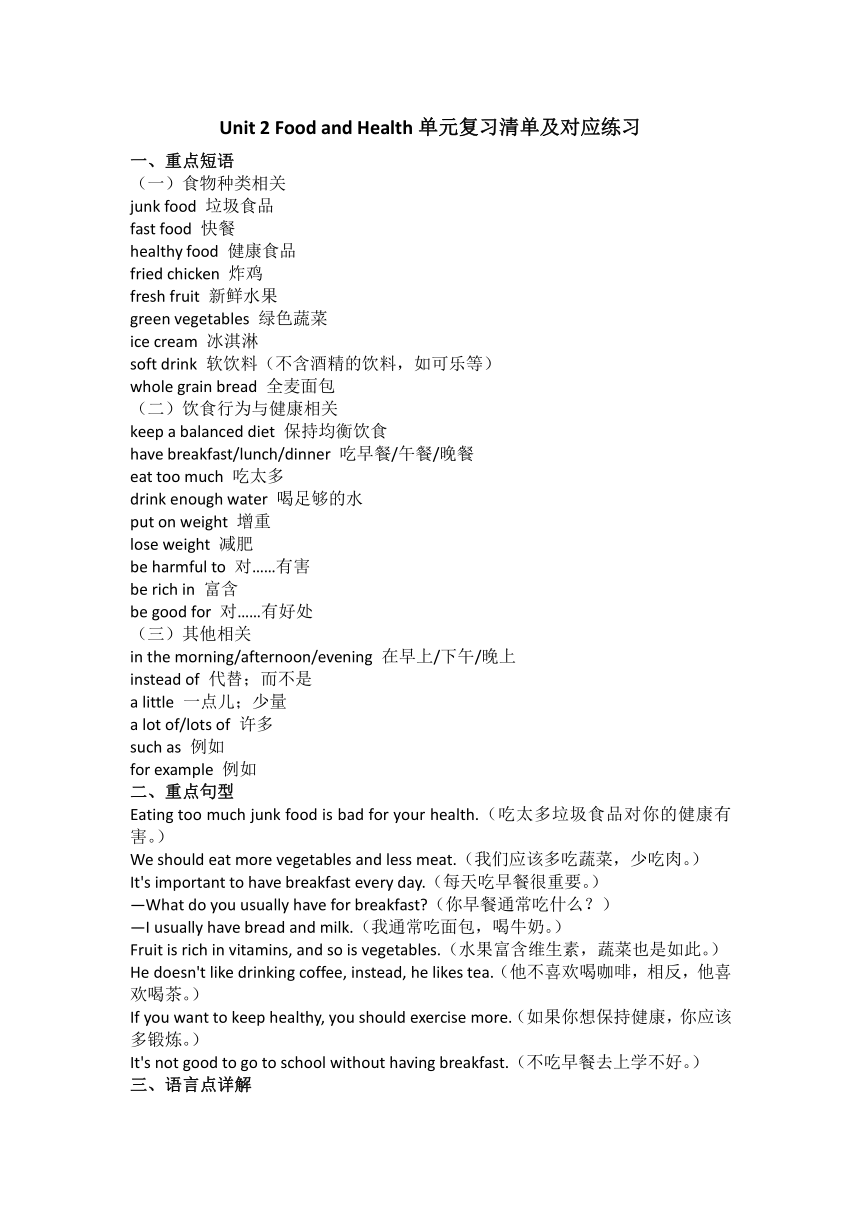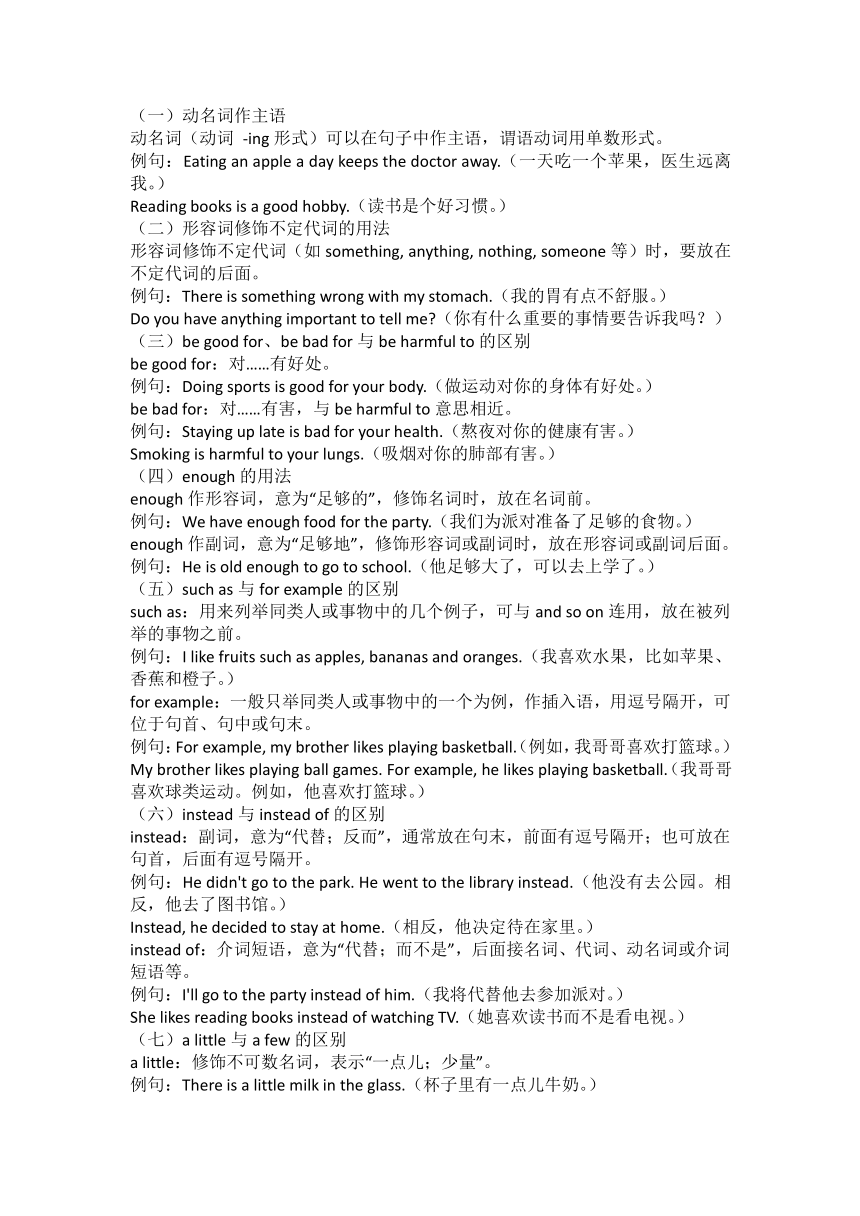Unit 2 Food and Health 单元知识清单及对应练习(含答案)北师大版(2024)七年级下册
文档属性
| 名称 | Unit 2 Food and Health 单元知识清单及对应练习(含答案)北师大版(2024)七年级下册 |  | |
| 格式 | docx | ||
| 文件大小 | 22.5KB | ||
| 资源类型 | 教案 | ||
| 版本资源 | 北师大版 | ||
| 科目 | 英语 | ||
| 更新时间 | 2025-03-11 14:41:56 | ||
图片预览


文档简介
Unit 2 Food and Health单元复习清单及对应练习
一、重点短语
(一)食物种类相关
junk food 垃圾食品
fast food 快餐
healthy food 健康食品
fried chicken 炸鸡
fresh fruit 新鲜水果
green vegetables 绿色蔬菜
ice cream 冰淇淋
soft drink 软饮料(不含酒精的饮料,如可乐等)
whole grain bread 全麦面包
(二)饮食行为与健康相关
keep a balanced diet 保持均衡饮食
have breakfast/lunch/dinner 吃早餐/午餐/晚餐
eat too much 吃太多
drink enough water 喝足够的水
put on weight 增重
lose weight 减肥
be harmful to 对……有害
be rich in 富含
be good for 对……有好处
(三)其他相关
in the morning/afternoon/evening 在早上/下午/晚上
instead of 代替;而不是
a little 一点儿;少量
a lot of/lots of 许多
such as 例如
for example 例如
二、重点句型
Eating too much junk food is bad for your health.(吃太多垃圾食品对你的健康有害。)
We should eat more vegetables and less meat.(我们应该多吃蔬菜,少吃肉。)
It's important to have breakfast every day.(每天吃早餐很重要。)
—What do you usually have for breakfast (你早餐通常吃什么?)
—I usually have bread and milk.(我通常吃面包,喝牛奶。)
Fruit is rich in vitamins, and so is vegetables.(水果富含维生素,蔬菜也是如此。)
He doesn't like drinking coffee, instead, he likes tea.(他不喜欢喝咖啡,相反,他喜欢喝茶。)
If you want to keep healthy, you should exercise more.(如果你想保持健康,你应该多锻炼。)
It's not good to go to school without having breakfast.(不吃早餐去上学不好。)
三、语言点详解
(一)动名词作主语
动名词(动词 -ing形式)可以在句子中作主语,谓语动词用单数形式。
例句:Eating an apple a day keeps the doctor away.(一天吃一个苹果,医生远离我。)
Reading books is a good hobby.(读书是个好习惯。)
(二)形容词修饰不定代词的用法
形容词修饰不定代词(如something, anything, nothing, someone等)时,要放在不定代词的后面。
例句:There is something wrong with my stomach.(我的胃有点不舒服。)
Do you have anything important to tell me (你有什么重要的事情要告诉我吗?)
(三)be good for、be bad for与be harmful to的区别
be good for:对……有好处。
例句:Doing sports is good for your body.(做运动对你的身体有好处。)
be bad for:对……有害,与be harmful to意思相近。
例句:Staying up late is bad for your health.(熬夜对你的健康有害。)
Smoking is harmful to your lungs.(吸烟对你的肺部有害。)
(四)enough的用法
enough作形容词,意为“足够的”,修饰名词时,放在名词前。
例句:We have enough food for the party.(我们为派对准备了足够的食物。)
enough作副词,意为“足够地”,修饰形容词或副词时,放在形容词或副词后面。
例句:He is old enough to go to school.(他足够大了,可以去上学了。)
(五)such as与for example的区别
such as:用来列举同类人或事物中的几个例子,可与and so on连用,放在被列举的事物之前。
例句:I like fruits such as apples, bananas and oranges.(我喜欢水果,比如苹果、香蕉和橙子。)
for example:一般只举同类人或事物中的一个为例,作插入语,用逗号隔开,可位于句首、句中或句末。
例句:For example, my brother likes playing basketball.(例如,我哥哥喜欢打篮球。)
My brother likes playing ball games. For example, he likes playing basketball.(我哥哥喜欢球类运动。例如,他喜欢打篮球。)
(六)instead与instead of的区别
instead:副词,意为“代替;反而”,通常放在句末,前面有逗号隔开;也可放在句首,后面有逗号隔开。
例句:He didn't go to the park. He went to the library instead.(他没有去公园。相反,他去了图书馆。)
Instead, he decided to stay at home.(相反,他决定待在家里。)
instead of:介词短语,意为“代替;而不是”,后面接名词、代词、动名词或介词短语等。
例句:I'll go to the party instead of him.(我将代替他去参加派对。)
She likes reading books instead of watching TV.(她喜欢读书而不是看电视。)
(七)a little与a few的区别
a little:修饰不可数名词,表示“一点儿;少量”。
例句:There is a little milk in the glass.(杯子里有一点儿牛奶。)
a few:修饰可数名词复数,表示“几个;少数”。
例句:I have a few friends in this city.(我在这个城市有几个朋友。)
四、语法聚焦
(一)一般现在时(表示饮食习惯和日常行为)
一般现在时表示经常性、习惯性的动作或现在的状态。
当主语是第三人称单数(he, she, it等)时,动词要加 -s或 -es。
例句:He often eats junk food.(他经常吃垃圾食品。)
She usually drinks milk in the morning.(她通常早上喝牛奶。)
在一般现在时的否定句和疑问句中,要借助助动词do或does。当主语是第三人称单数时,用does,动词还原;其他人称用do。
例句:I don't like vegetables.(我不喜欢蔬菜。)
Does she have breakfast every day (她每天都吃早餐吗?)
(二)可数名词与不可数名词
可数名词有单数和复数形式。复数形式一般在词尾加 -s,以s, x, ch, sh结尾的名词加 -es;以辅音字母加y结尾的名词,变y为i再加 -es;以f或fe结尾的名词,变f或fe为v再加 -es等。
例句:apple - apples, box - boxes, watch - watches, family - families, knife - knives
不可数名词没有复数形式,不能直接用数字修饰。表示数量时,常用“数词 + 量词 + of + 不可数名词”结构。
例句:a glass of water(一杯水),two pieces of bread(两片面包)
五、练习题
(一)单项选择
1. —What would you like to drink
—______ juice, please.
A. A few B. A little C. Many D. Lot of
2. Eating too much meat ______ bad for your health.
A. am B. is C. are D. be
3. We should eat ______ vegetables and ______ junk food.
A. more; less B. more; more C. less; more D. less; less
4. He likes playing basketball ______ playing football.
A. instead B. instead of C. but D. and
5. There is ______ wrong with my tooth. I need to see a dentist.
A. something B. anything C. nothing D. everything
(二)用所给词的适当形式填空
1. ______ (eat) too much sugar is bad for your teeth.
2. My mother often ______ (cook) healthy food for us.
3. We should drink ______ (enough) water every day.
4. There are a lot of ______ (tomato) in the fridge.
5. He is old enough ______ (go) to school by himself.
(三)根据汉语提示完成句子
1. 我们应该保持均衡的饮食。
We should ______ ______ ______ diet.
2. 他早餐通常吃面包和鸡蛋。
He usually ______ bread and eggs ______ breakfast.
3. 吃太多冰淇淋对你有害。
Eating too much ice cream ______ ______ ______ you.
4. 水果富含维生素。
Fruit ______ ______ ______ vitamins.
5. 你应该多喝水,而不是喝软饮料。
You should drink more water ______ ______ soft drinks.
(四)句型转换
1. I like eating fruits.(改为否定句)
I ______ ______ eating fruits.
2. She has breakfast at home every day.(改为一般疑问句)
______ she ______ breakfast at home every day
3. He often goes to school by bike.(用never改写句子)
He ______ ______ to school by bike.
4. The book is very interesting.(用enough改写句子)
The book is ______ ______ for me to read.
5. I like apples, bananas and oranges.(用such as改写句子)
I like fruits ______ ______ apples, bananas and oranges.
(五)补全对话
A: Hi, Lucy. 1. ______
B: I usually have bread, eggs and milk for breakfast.
A: 2. ______
B: Because they are healthy food. What about you
A: 3. ______
B: Eating too much junk food is bad for your health.
A: I know. But I like it. 4. ______
B: You should eat more fruits and vegetables. And do some exercise.
A: 5. ______ Thank you.
B: You're welcome.
(一)单项选择
1. B
2. B
3. A
4. B
5. A
(二)用所给词的适当形式填空
1. Eating
2. cooks
3. enough
4. tomatoes
5. to go
(三)根据汉语提示完成句子
1. keep a balanced
2. has; for
3. is bad for
4. is rich in
5. instead of
(四)句型转换
1. don't like
2. Does; have
3. never goes
4. interesting enough
5. such as
(五)补全对话
1. What do you usually have for breakfast
2. Why do you like having them for breakfast
3. I usually have junk food for breakfast.
4. What should I do
5. That sounds good.
一、重点短语
(一)食物种类相关
junk food 垃圾食品
fast food 快餐
healthy food 健康食品
fried chicken 炸鸡
fresh fruit 新鲜水果
green vegetables 绿色蔬菜
ice cream 冰淇淋
soft drink 软饮料(不含酒精的饮料,如可乐等)
whole grain bread 全麦面包
(二)饮食行为与健康相关
keep a balanced diet 保持均衡饮食
have breakfast/lunch/dinner 吃早餐/午餐/晚餐
eat too much 吃太多
drink enough water 喝足够的水
put on weight 增重
lose weight 减肥
be harmful to 对……有害
be rich in 富含
be good for 对……有好处
(三)其他相关
in the morning/afternoon/evening 在早上/下午/晚上
instead of 代替;而不是
a little 一点儿;少量
a lot of/lots of 许多
such as 例如
for example 例如
二、重点句型
Eating too much junk food is bad for your health.(吃太多垃圾食品对你的健康有害。)
We should eat more vegetables and less meat.(我们应该多吃蔬菜,少吃肉。)
It's important to have breakfast every day.(每天吃早餐很重要。)
—What do you usually have for breakfast (你早餐通常吃什么?)
—I usually have bread and milk.(我通常吃面包,喝牛奶。)
Fruit is rich in vitamins, and so is vegetables.(水果富含维生素,蔬菜也是如此。)
He doesn't like drinking coffee, instead, he likes tea.(他不喜欢喝咖啡,相反,他喜欢喝茶。)
If you want to keep healthy, you should exercise more.(如果你想保持健康,你应该多锻炼。)
It's not good to go to school without having breakfast.(不吃早餐去上学不好。)
三、语言点详解
(一)动名词作主语
动名词(动词 -ing形式)可以在句子中作主语,谓语动词用单数形式。
例句:Eating an apple a day keeps the doctor away.(一天吃一个苹果,医生远离我。)
Reading books is a good hobby.(读书是个好习惯。)
(二)形容词修饰不定代词的用法
形容词修饰不定代词(如something, anything, nothing, someone等)时,要放在不定代词的后面。
例句:There is something wrong with my stomach.(我的胃有点不舒服。)
Do you have anything important to tell me (你有什么重要的事情要告诉我吗?)
(三)be good for、be bad for与be harmful to的区别
be good for:对……有好处。
例句:Doing sports is good for your body.(做运动对你的身体有好处。)
be bad for:对……有害,与be harmful to意思相近。
例句:Staying up late is bad for your health.(熬夜对你的健康有害。)
Smoking is harmful to your lungs.(吸烟对你的肺部有害。)
(四)enough的用法
enough作形容词,意为“足够的”,修饰名词时,放在名词前。
例句:We have enough food for the party.(我们为派对准备了足够的食物。)
enough作副词,意为“足够地”,修饰形容词或副词时,放在形容词或副词后面。
例句:He is old enough to go to school.(他足够大了,可以去上学了。)
(五)such as与for example的区别
such as:用来列举同类人或事物中的几个例子,可与and so on连用,放在被列举的事物之前。
例句:I like fruits such as apples, bananas and oranges.(我喜欢水果,比如苹果、香蕉和橙子。)
for example:一般只举同类人或事物中的一个为例,作插入语,用逗号隔开,可位于句首、句中或句末。
例句:For example, my brother likes playing basketball.(例如,我哥哥喜欢打篮球。)
My brother likes playing ball games. For example, he likes playing basketball.(我哥哥喜欢球类运动。例如,他喜欢打篮球。)
(六)instead与instead of的区别
instead:副词,意为“代替;反而”,通常放在句末,前面有逗号隔开;也可放在句首,后面有逗号隔开。
例句:He didn't go to the park. He went to the library instead.(他没有去公园。相反,他去了图书馆。)
Instead, he decided to stay at home.(相反,他决定待在家里。)
instead of:介词短语,意为“代替;而不是”,后面接名词、代词、动名词或介词短语等。
例句:I'll go to the party instead of him.(我将代替他去参加派对。)
She likes reading books instead of watching TV.(她喜欢读书而不是看电视。)
(七)a little与a few的区别
a little:修饰不可数名词,表示“一点儿;少量”。
例句:There is a little milk in the glass.(杯子里有一点儿牛奶。)
a few:修饰可数名词复数,表示“几个;少数”。
例句:I have a few friends in this city.(我在这个城市有几个朋友。)
四、语法聚焦
(一)一般现在时(表示饮食习惯和日常行为)
一般现在时表示经常性、习惯性的动作或现在的状态。
当主语是第三人称单数(he, she, it等)时,动词要加 -s或 -es。
例句:He often eats junk food.(他经常吃垃圾食品。)
She usually drinks milk in the morning.(她通常早上喝牛奶。)
在一般现在时的否定句和疑问句中,要借助助动词do或does。当主语是第三人称单数时,用does,动词还原;其他人称用do。
例句:I don't like vegetables.(我不喜欢蔬菜。)
Does she have breakfast every day (她每天都吃早餐吗?)
(二)可数名词与不可数名词
可数名词有单数和复数形式。复数形式一般在词尾加 -s,以s, x, ch, sh结尾的名词加 -es;以辅音字母加y结尾的名词,变y为i再加 -es;以f或fe结尾的名词,变f或fe为v再加 -es等。
例句:apple - apples, box - boxes, watch - watches, family - families, knife - knives
不可数名词没有复数形式,不能直接用数字修饰。表示数量时,常用“数词 + 量词 + of + 不可数名词”结构。
例句:a glass of water(一杯水),two pieces of bread(两片面包)
五、练习题
(一)单项选择
1. —What would you like to drink
—______ juice, please.
A. A few B. A little C. Many D. Lot of
2. Eating too much meat ______ bad for your health.
A. am B. is C. are D. be
3. We should eat ______ vegetables and ______ junk food.
A. more; less B. more; more C. less; more D. less; less
4. He likes playing basketball ______ playing football.
A. instead B. instead of C. but D. and
5. There is ______ wrong with my tooth. I need to see a dentist.
A. something B. anything C. nothing D. everything
(二)用所给词的适当形式填空
1. ______ (eat) too much sugar is bad for your teeth.
2. My mother often ______ (cook) healthy food for us.
3. We should drink ______ (enough) water every day.
4. There are a lot of ______ (tomato) in the fridge.
5. He is old enough ______ (go) to school by himself.
(三)根据汉语提示完成句子
1. 我们应该保持均衡的饮食。
We should ______ ______ ______ diet.
2. 他早餐通常吃面包和鸡蛋。
He usually ______ bread and eggs ______ breakfast.
3. 吃太多冰淇淋对你有害。
Eating too much ice cream ______ ______ ______ you.
4. 水果富含维生素。
Fruit ______ ______ ______ vitamins.
5. 你应该多喝水,而不是喝软饮料。
You should drink more water ______ ______ soft drinks.
(四)句型转换
1. I like eating fruits.(改为否定句)
I ______ ______ eating fruits.
2. She has breakfast at home every day.(改为一般疑问句)
______ she ______ breakfast at home every day
3. He often goes to school by bike.(用never改写句子)
He ______ ______ to school by bike.
4. The book is very interesting.(用enough改写句子)
The book is ______ ______ for me to read.
5. I like apples, bananas and oranges.(用such as改写句子)
I like fruits ______ ______ apples, bananas and oranges.
(五)补全对话
A: Hi, Lucy. 1. ______
B: I usually have bread, eggs and milk for breakfast.
A: 2. ______
B: Because they are healthy food. What about you
A: 3. ______
B: Eating too much junk food is bad for your health.
A: I know. But I like it. 4. ______
B: You should eat more fruits and vegetables. And do some exercise.
A: 5. ______ Thank you.
B: You're welcome.
(一)单项选择
1. B
2. B
3. A
4. B
5. A
(二)用所给词的适当形式填空
1. Eating
2. cooks
3. enough
4. tomatoes
5. to go
(三)根据汉语提示完成句子
1. keep a balanced
2. has; for
3. is bad for
4. is rich in
5. instead of
(四)句型转换
1. don't like
2. Does; have
3. never goes
4. interesting enough
5. such as
(五)补全对话
1. What do you usually have for breakfast
2. Why do you like having them for breakfast
3. I usually have junk food for breakfast.
4. What should I do
5. That sounds good.
同课章节目录
